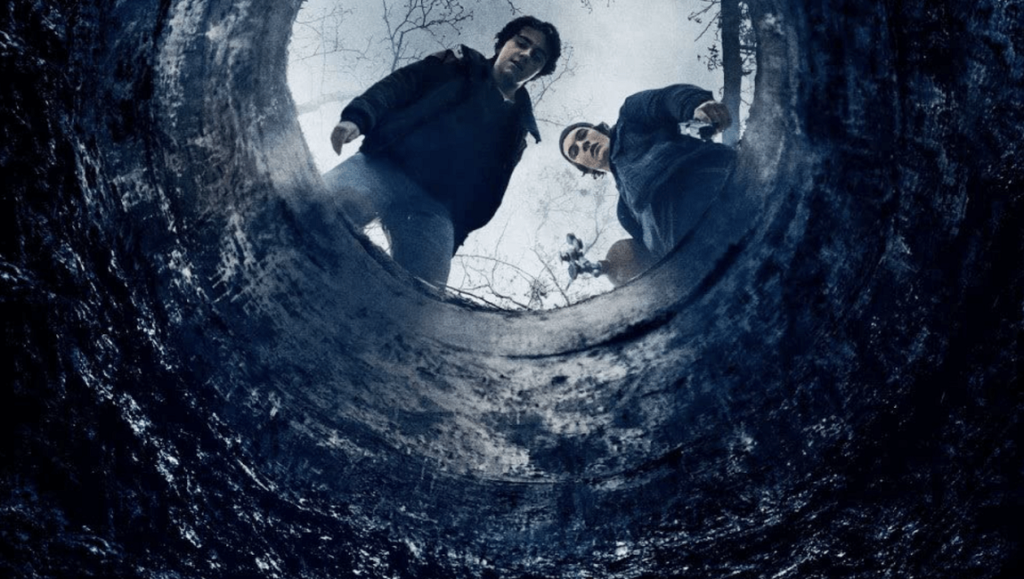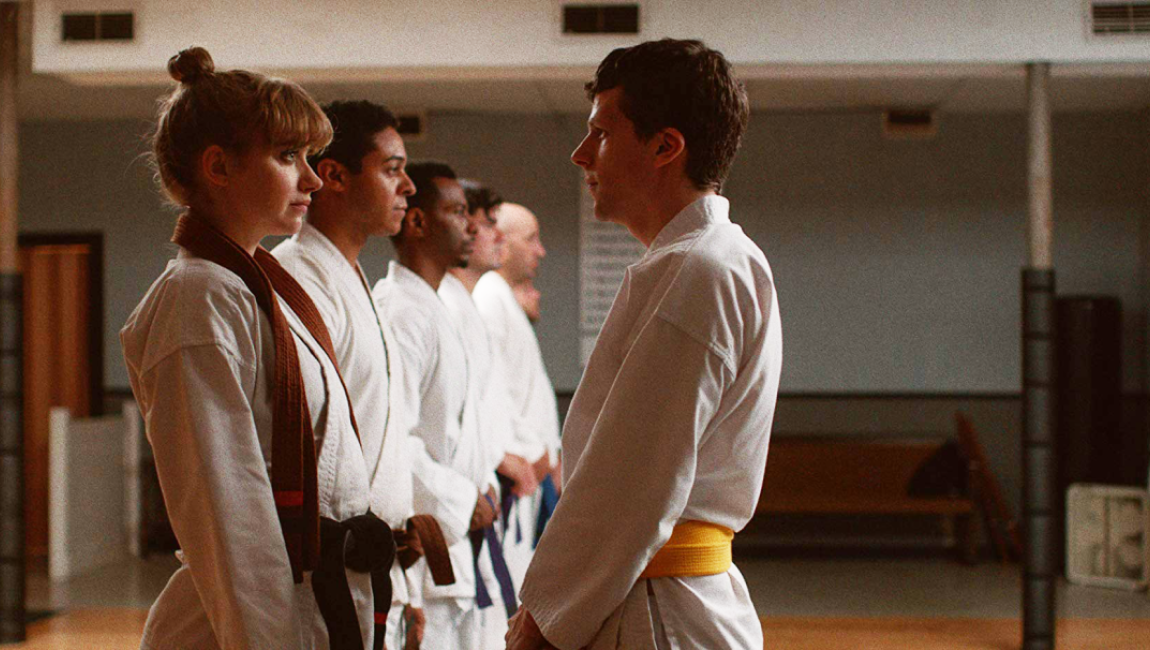OK, so things don’t really vanish anymore: even the most limited film release will (most likely, eventually) find its way onto some streaming service or into some DVD bargain bin assuming that those still exist by the time this sentence finishes. In other words, while the title of In Review Online’s monthly feature devoted to current domestic and international arthouse releases in theaters will hopefully bring attention to a deeply underrated (even by us) Kiyoshi Kurosawa film, it isn’t a perfect title. Nevertheless, it’s always a good idea to catch-up with films before some… other things happen.
American Skin
Actor Nate Parker took the 2016 Sundance Film Festival by storm with his directorial debut The Birth of a Nation, which chronicled the famed 1831 slave rebellion led by preacher Nat Turner. The film was met with rave reviews by attendees and resulted in the biggest acquisition deal in Sundance history at that time. Upon its national release ten months later, the film was met with utter indifference by critics and audience members alike, both of whom were in complete agreement that the emperor indeed had no clothes. That assessment is confirmed with Turner’s follow-up effort, American Skin, a film that debuted two years ago at the 2019 Venice Film Festival and which was finally picked up for distribution by Vertical Entertainment, though the film boasts a curious lack of presence on the distributor’s official website. One need only view the final product — an embarrassing and ham-fisted production posing as a topical provocation on police brutality and race relations in modern American society — to understand why. What is meant to be a righteous howl of racial indignation instead takes on the shape of a classroom presentation courtesy of an ill-prepared student whose knowledge of charged subject matter is limited to Wikipedia articles and old episodes of Law & Order. The end result wouldn’t be quite so offensive if Parker didn’t present his material in such a smug and self-congratulatory manner, as if his rhetoric was not only enlightening, but revelatory. This is the type of film where a character questions if police target low-income neighborhoods and another solemnly intones, “No, black neighborhoods,” while dramatic music fills the soundtrack and the other actors on screen gasp out loud, as if shaken to their cores by this obvious semantic shift.
Parker has given himself the plum role of a grieving father who, seeking justice on behalf of his 13-year-old son who was brutally murdered at the hands of a police officer during a routine traffic stop, takes the entire precinct hostage and creates a kangaroo court that will determine the ultimate fate of the accused cop. This results in prolonged discussions of racism and classism that are delivered with the subtlety of a sledgehammer and contain about as much depth as a Fox News segment. It would be easy to say that the film is at least well-intentioned, but Parker invests far too much in presenting his character as some sort of messianic truth-teller, brought to this earth to right the wrongs of an oppressed people. By film’s end, it becomes clear that this is nothing more than a vanity project of epic proportions, as Parker is bathed in beatific white light artfully streaming through Venetian blinds while his accused tearfully says to him, “I feel like you have lifted a weight off my shoulders. For the first time in my life, I am questioning nothing.” That any of the actors were able to get through this farce with a straight face is a testament to their professionalism, but that Parker actually believes the uniform of a school janitor would consist of slim-fit chinos and a skintight polo is symptomatic of his absolute ignorance when it comes to the everyday struggles of the common man. And then, of course, there’s Parker’s choice to frame the film as a documentary courtesy of a grad student completing his thesis, which allows his cinematic shortcomings to go unchecked (of which there are too many to address in any sort of detail here). Ultimately, American Skin proves that the path from the birth of a nation to the death of thought-provoking contemporary cinema is indeed a short one.
Writer: Steven Warner

Credit: RLJE Films
PG: Psycho Goreman
In director Steven Kostanski‘s Psycho Goreman, two children — brother and sister — dig up an evil alien beefcake hellbent on destroying the universe. Thankfully, he’s also easily controlled with the help of the magical amulet with which he was buried. Together, the three of them go on wacky, lightly comic adventures and fight the aliens who want to kill their alien, all while the kids learn to love each other despite their differences. Obviously, Psycho Goreman, FKA The Archduke of Nightmares, learns about love too. To say there’s not much here would be an understatement.
If there’s anything in the film that merits praise, it’s the practical VFX work. In fact, the whole thing reads as an excuse to show off the effects team’s prowess at making monsters that look like Power Rangers villains and then tearing them apart, limb from limb. And while the artistry doesn’t match the heights of Savini or Baker, it is sturdy, charming, and genuinely impressive for a project that feels this small. The bigger problem is that this feeling of slightness seems to stem less from budgetary concerns than filmmaking that is amateurish and mostly passionless. Is it so much to ask that a science fiction movie about an alien killing machine have even one memorable image? It must be, because all that aforementioned limb-tearing is set against the listless backdrop of suburbia and framed in shots devoid of personality or purpose. It’s hard for viewers to give a shit about everything that surrounds the effects work precisely because the movie itself doesn’t seem to. It’s little more than a thin, grating excuse to show off some make-up and rattle off references to things the filmmakers enjoy, which is just the same stuff made from 1980 to 1999 to which homage has become a cottage industry. The difference between homage like this, then, and the genuine article is not just the spark of invention, but also work beyond baseline competence and a concern for more than just prosthetics. Exhibit A: Dawn of the Dead features all-time work from Tom Savini and would certainly be lesser if it didn’t, but there’s plenty of substance beyond that to suggest it would likely remain a classic. Strip Psycho Goreman of its effects and you’re left with nothing of value.
Writer: Chris Mello
Run Hide Fight
Any film critic worth their salt can speak to the near-impossible task of reviewing films in a true vacuum, with personal biases, production knowledge, and the contextual influence of a director’s past works rendering objectivity a beautiful rarity. That’s especially true of a film like Run Hide Fight, what with its ties to a questionable production company that traffics in what can charitably be referred to as right-wing propaganda. Setting all of that aside, though, and taken solely on its own terms, Run Hide Fight accomplishes exactly what it sets out to do: create a taut thriller that not only uses national tragedy as the genesis for its cheap genre thrills, but also serves as a piece of wish fulfillment for pro-gun hard-liners who believe that the only answer to violence is more violence. The purest exploitation flick released in ages, Run Hide Fight is some sort of unholy mash-up of Die Hard and Elephant, where a school shooting and hostage situation is interrupted by a lone student who has had enough of this shit and is going to take matters into her own hands, waging a one-woman war against her assailants. Luckily, the student in question, Zoe (Isabel May), is an expert hunter and markswoman whose convenient emotional detachment is on full display in the opening scene, where she bludgeons to death a wounded deer — the result of her own bullet — with a large boulder. Her survival instincts get quite a workout over the course of the next 105 minutes, which finds Zoe beating and shooting her way to justice.
Writer-director Kyle Rankin, who is a long way from his days as the meek filmmaker highlighted in season two of Project Greenlight, makes no bones about the type of film he is making: exploitative trash masquerading as provocation. He has no interest in mining the depths of his antagonists, who are reduced to harmful stereotypes: gay, afflicted by mental illness, victims of bullying, prone to dark clothing and heavy make-up. Indeed, the only person here given anything even remotely close to depth is Zoe, who uses the occasion to come to terms with the recent death of her mother, whose ghost takes the human form of Radha Mitchell and whom she converses with throughout the film. (Yes, you read that correctly.) For all that, Rankin actually does possess more than a modicum of talent behind the camera, utilizing the empty space in his widescreen compositions to create palpable tension. There is legitimate artistry to his visuals: the abandoned school hallways are cast in darkness, offset by the white brick walls that practically glow in the background, highlighting his slinking cast members in their game of cat-and-mouse. Elsewhere, an attack scene involving a room full of balloons that spill into the hall is particularly effective.
Yet, it has to be asked what the worth of such talent is when utilized for something so base and utterly reprehensible. When the comely Spanish teacher is forced to strip by one of the assailants, it is clearly not only for the eyes of the character, but for the film’s viewers’ as well. Simply put, it’s a vile film, insidious in its despicable presentation and in its agenda. It does nothing more than play on the fears and bigotries of its audience members and aim to confirm their disgusting biases. Objectively — frustratingly — Run Hide Fight is a well-made film that accomplishes its intended tension-building goals, and includes committed performances from the likes of May, Mitchell, Thomas Jane, and Treat Williams. Subjectively, everyone involved in the making of this film, and those who find enjoyment in such lowest-common-denominator “entertainment,” can go fuck themselves.
Writer: Steven Warner

Credit: London Film Festival
Supernova
While actor-turned-director Harry Macqueen‘s debut film Hinterland utilized the premise of a road trip to chronicle a fractured, intimate relationship (earning fetching reviews from critics in the process), his follow-up, Supernova, also features a physical journey designed to mirror its character’s emotional upheaval. Supernova depicts the relationship between Sam (Colin Firth) and Tusker (Stanley Tucci), a couple who embark on a trip across Britain in their campervan to meet family and friends following Tusker’s recent diagnosis of early-onset dementia. A rather opportune advert for touring the English countryside, Supernova is far from a leisurely experience, powerful and gut-wrenching in its discussion of terminal illness and the harsh path to acceptance that comes with that. Both Firth and Tucci are at the top of their game, elegantly playing off each other as a charismatic couple attuned to the savvy observations in Macqueen’s tender screenplay. The interdependence of their long-term relationship is particularly evident; small details, such as their instinct to accentuate positives when either notices the other is ailing, are touching, and Tucci’s approach to detailing Tusker’s deterioration is commendably distinct, peppered with tiny inflections which hint at the toll of his condition. His performance considers minute details of compromised brain function, such as the muscular spasms and split-second lapses in thought that come with such debilitating conditions. The result is a film that is often painful to watch but which feels vital in its resounding frankness about the difficult choices one faces when the prospect of death becomes an imminent reality. To its credit, Supernova features a gay romance that could be easily interchanged with a heterosexual one, speaking to the universality of both love and death with profound candor, and balancing out the innate sentimentality that comes with films of this ilk. [Published as part of London Film Festival 2020 — Dispatch 2.]
Writer: Calum Reed
Bloody Hell
As film festivals have gone largely virtual in the face of our new pandemic reality, many critics have lamented the now-absent communal aspect of these events; gone are the post-screening conversations and interviews, the mingling in long lines, and the thrill of watching a movie wash over a rapt audience. Particularly hard hit are “midnight madness” style screenings; horror, like comedy, frequently works better with a crowd. One imagines watching Bloody Hell with such a crowd, settled in late at night after a long day of more reputable fare, probably a few drinks deep, ready to cut loose and get rowdy. Alas, any energy that might have infused Bloody Hell with an extra-textual quality is lost when viewed at home, alone, and the film’s issues become more difficult to paper over. Directed by Alister Grierson and written by Robert Benjamin, Bloody Hell is a horror-comedy that forgets to be scary and gets bogged down by an obnoxious sense of humor. Ben O’Toole stars as Rex, an improbable blend of Ash from the iconic Evil Dead films and Mac from Its Always Sunny in Philadelphia. After a whiplash-inducing prologue, where he thwarts a bank robbery and gets sent to prison for his efforts, Rex gets released only to find that he’s become a social media star. Deciding he needs a vacation, and hoping to avoid his adoring public, Rex hops a plane to Finland. As luck would have it, he’s immediately kidnapped and strung up in the basement by what appears to be the Finnish version of the Texas Chainsaw Massacre clan.
Grierson and Benjamin (who also edited the film) burn through plot at a ludicrous pace, keeping things lively with ostentatious fast cutting and lots of flashy camera moves. Once Rex is relegated to the basement holding pen, the film’s biggest misstep is thrown into sharp relief. Here, the filmmakers have literalized Rex’s interior monologue, personified on screen as a second Rex that only he can see. This move casts O’Toole in a dual role that mostly requires he talk to himself, although the film makes clear that no one else can see this psychic projection. Less clear is whether or not Rex is supposed to be schizophrenic, as his visualized id becomes pushier and more caustic. Whatever the case, the gimmick wears thin quickly, particularly once we meet Alia (Meg Fraser), the one family member who doesn’t enjoy the practice of kidnapping and murdering tourists for food. At this point, the film sort of turns into a weird rom-com; it pumps the brakes on mocking Rex’s alpha male shtick and instead begins indulging it. Throw in some Family Guy-style cutaway gags and Bloody Hell starts getting stale, fast. Still, this is a strong cast and there’s a sharp sense of humor buried somewhere under all of the faux-ironic posturing and annoyingly flashy style. O’Toole is at least a legitimate find, and Grierson and Benjamin certainly have talent; if they can get some of these belabored tics out of their system, they could actually make something pretty special. Fingers crossed. [Originally published as part of Nightstream 2020 — Dispatch 2.]
Writer: Daniel Gorman

Credit: Saban Films
Don’t Tell a Soul
There was always something slightly sinister lurking beneath the surface of Rainn Wilson’s portrayal of Dwight Schrute in the American version of The Office, and that unsettling affect is ratcheted a few notches in the new thriller Don’t Tell a Soul, in which Wilson plays a humble security guard who falls into a 20-foot hole in the middle of nowhere while chasing two thieving brothers. There’s plenty more than meets the eye to both Wilson’s character and the film as a whole, which begins something like a low-budget Don’t Breathe but soon morphs into a portrait of poisoned familial bonds, as aforementioned brothers Matt (Fionn Whitehead) and Joey (Jack Dylan Grazer) butt heads over how to best handle the pesky security guard. Joey is younger and, thus, more prone to feelings of guilt and doubt; Matt is a violent asshole so unrepentant in his bad behavior that he more accurately resembles a cartoon character than an actual flesh-and-blood human being. Writer-director Alex McAulay certainly isn’t subtle in regards to character development and audience allegiance, although Don’t Tell a Soul is a film that never pretends to be substantive, save for a maudlin ending completely at odds with everything that came before it. That the ending is still somewhat effective reveals McAulay’s proficiency as a filmmaker, here making his directorial debut after writing 2017’s aggressively quirky teen thriller Flower, and it’s both surprising and impressive to discover that the film was shot digitally, the overall look so crisp and filmic. Whitehead, best known for his role as the hapless lead soldier in Christopher Nolan’s Dunkirk, plays successfully against type as a vicious and heartless scumbag, while Grazer dials down his familiar sarcastic quirks (It, Shazam) to deliver a solid performance of his own, one that requires him to channel both a childlike innocence and a seething anger aching to break free. It’s Wilson, though, who steals the show, and does so in ways that are impossible to discuss without spoiling the film’s myriad plot twists, the majority of which are surprisingly clever. Don’t Tell a Soul is a mean, nasty little film — meant as a compliment — but one that ultimately, too conservatively, hedges its bets, which is a real shame. What could have gone down as a potential genre game-changer instead becomes merely an entertaining diversion, and nothing more. There are certainly worse things to be.
Writer: Steven Warner
Savage State
Although the Western may be long past its heyday, there are still filmmakers working within the genre who are trying to redefine and revive it, through the introduction of new ideas and other unique means of expression. There are some trends, though, that bind together a select group of ‘post-modern Westerns’: an emphasis on less plot and less action, with the focus shifted instead to atmospheric mood or some contemplative, mysterious or mystical quality. Call these ‘Transcendental Westerns’ — and David Perrault’s Savage State fits the bill. The film is pretty much unconcerned with narrative and more solicitous toward its sun-dappled, trippy visual effects. An eclectic film that manages to combine European romanticism with myths of the Old West, Savage State mostly constitutes a mix of serene and tense moments. The intrigue of that strategy is apparent from the film’s first act, and it helps the French Perrault render his Western as a sensory cinematic experience — with particularly skillful and evocative use of mise-en-scéne. From the Kubrickian candle-lit sets to the Viscontian staging and even some camera movements that seem to mimic Max Ophüls in period drama mode, Perrault shapes an immersive aesthetic that hooks the viewer.
And then the narrative kicks, sends a group of women on the run, and Perrault leaves his immaculate interiors for natural landscapes and otherworldly sights. Unfortunately, it’s also here, heading into the second act, where things are most underdeveloped — even the climactic battle between said women and a wild bunch of masked mercenary men (cf. Sergio Corbucci’s spaghetti western Django) falls flat; the scene’s ridiculous, simple-minded execution fails to even muster any entertaining, B-movie grotesqurie. One can certainly appreciate Savage State’s psychedelic feminist western ambitions, but it doesn’t really follow through on them as convincingly in the latter half — the electronic soundtrack (which resembles Cliff Martinez’s work for Soderbergh’s The Knick of all things) and an overuse of slow motion don’t sell the asthetic effect like they should. And merely casting your film with women isn’t enough on its own to position it as ‘feminist’ — especially, when most of those characters come off as little more than dummies at a rodeo show. This has become a recurring issue with many a contemporary, post-modern Western — they don’t do much with character, and settle instead for cyphers vaguely representative of old Western classics, more fetish than flesh. [Published as part of Fantasia Fest 2020 — Dispatch 6.]
Writer: Ayeen Forootan

Credit: Vertical Entertainment
Breaking Fast
The marketing materials for the new queer comedy Breaking Fast make the film look like the kind of salacious, low-budget filler clogging the pipelines of Amazon Prime, with its smiling, attractive male leads promising a few moments of full-frontal nudity and not much else. What a surprise, then, that the movie features what is quite possibly the most chaste gay romance ever put to film, the kind that would feel comfortably at home on the Hallmark network. Aside from some talk of “B.V.” (butt virginity) and a brief moment of bare buttocks, writer-director Mike Mosallam takes a far more subdued approach to his material, a respectful tone that feels tied to the Islamic holy month of Ramadan that features prominently in his story of two damaged thirty-somethings tentatively searching for love in West Hollywood. Mohammed (Haaz Sleiman) is a devoutly religious Muslim man recovering from a failed relationship with a closeted partner; Kal (Tom Hardy-lookalike Michael Cassidy) is attempting to overcome familial demons that have left him wary of love. Both meet and bond during the 30 days of Ramadan, with Kal’s time spent as a Navy brat in Jordan providing him with knowledge of both the holiday itself and the delectable dishes served each night as part of the titular ritual. Abstinence of not only food, but any sort of sinful activity or impure thoughts during the hours between sunrise and sunset provide Mohammed and Kal the time to truly get to know one another; but why they don’t take sexy advantage of the night is another question entirely, so palpable is Sleiman and Cassidy’s chemistry.
Breaking Fast has far more on its mind than mere possible canoodling, though, as Mosallam goes out of his way to shine light on a religion that is too often misrepresented and commonly misunderstood by most American audiences, and the potential hypocrisy that exists at the heart of any organized religion when it comes to its treatment of the gay community. Good intentions aside, one does wish the film approached its talking points in a more organic manner, as the proceedings practically grind to a halt for a late-film dinner conversation that addresses everything on Mosallam’s mind in regards to Islam and homosexuality. And it doesn’t help matters that, aside from the two leads, the performances are wildly inconsistent and the filmmaking style beyond bland. Still, there is something decidedly charming, almost novel even, in the film’s refusal to give in to anything even remotely vulgar or risqué; when the two leads finally kiss in the film’s closing moments, it truly means something. That old-fashioned flair is a welcome touch, and if Breaking Fast is an admittedly flawed film, it’s also a well-intentioned and very sweet one. Its small surprises help sustain it, but one remains: why is this being released in January and not later this Spring, when Ramadan actually takes place?
Writer: Steven Warner







